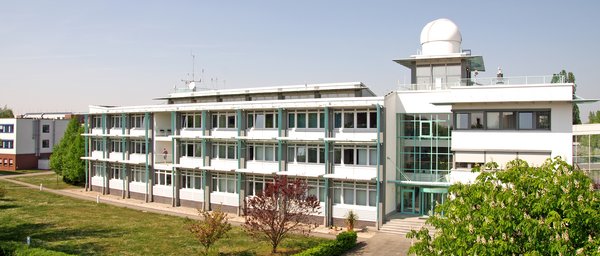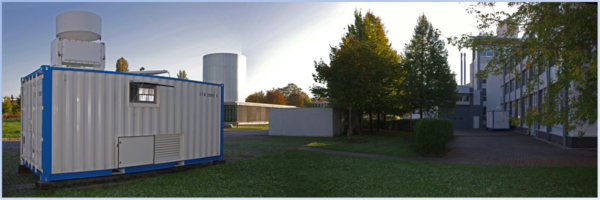
TROPOS, main building, Source: Patric Seifert/TROPOS


TROPOS, main building, Source: Patric Seifert/TROPOS
In the "Research Park Leipzig/Permoserstraße" close to the Environmental Research Center, other research establishments and related businesses you fi nd the Leibniz Institute for Tropospheric Research e.V. (TROPOS). Its name identifies the TROPOS as a member of the Leibniz Association. The TROPOS was founded for the investigation of physical and chemical processes in the polluted troposphere.Meanwhile, a well-defined and globally unique research profile of TROPOS emerged, with a focus on aerosols, i.e. small airborne particles, and clouds. Despite their minute absolute amount, aerosols and clouds are essential parts of the atmosphere because they control the budgets of energy, water and trace substances of the Earth System. Human activities can change these highly disperse systems and thus feed back on human beings. This may happen via health effects caused by inhaled particles and fog droplets and through regional and global climate change.Despite these strong connections between human beings, aerosols, and clouds important physico-chemical processes of aerosol and cloud formation and the relationships with climate and health are poorly understood. This limitation is mainly due to analytical difficulties with the very small samples and with the complex behavior of tropospheric multiphase systems, in which individual processes seldom can be distinguished. In climate research this limitation is refl ected in much larger uncertainties in predicted anthropogenic aerosol and cloud effects in comparison to numbers published by the Intergovernmental Panel on Climate Change for additional greenhouse gases. Rapid advances in our understanding of tropospheric multiphase processes and an application of this process understanding to the prediction of the consequences of human impacts can only be expected from concerted approaches from several directions. Consequently, the Leibniz Institute for Tropospheric Research conducts field studies in several polluted regions parallel to the development of analytical methods for aerosol and cloud research. These tools are not only applied in field experiments but also in extensive laboratory investigations, which form a second major activity. A third and equally important approach consists of the formulation and application of numerical models that reach from process models to regional simulations of the formation, transformation and effects of tropospheric multiphase systems. The Leibniz Institute for Tropospheric Research belongs to the Leibniz Association, which is named after Gottfried Wilhelm Leibniz (1646 - 1716), philosopher and universal scholar. His notion of a close combination between theory and practice (theoria cum praxi) is evident concerning the institutes´ work.

TROPOS main building with the Cloud Labatory in the backround and LACROS measurement instruments, Source: Patrick Seifert/TROPOS
The Leibniz Association connects 95 independent research institutions that range in focus from the natural, engineering and environmental sciences via economics, spatial and social sciences to the humanities. Leibniz Institutes address issues of social, economic and ecological relevance. They conduct knowledge-driven and applied basic research, maintain scientific infrastructure and provide research-based services. The Leibniz Association identifies focus areas for knowledge transfer to policy-makers, academia, business and the public. Leibniz Institutes collaborate intensively with universities – in the form of “WissenschaftsCampi” (thematic partnerships between university and non-university research institutes), for example – as well as with industry and other partners at home and abroad. They are subject to an independent evaluation procedure that is unparalleled in its transparency. Due to the institutes’ importance for the country as a whole, they are funded jointly by the Federation and the Länder, employing some 18,100 individuals, including 9,200 researchers. The entire budget of all the institutes is approximately 1.64 billion EUR. http://www.leibniz-association.eu